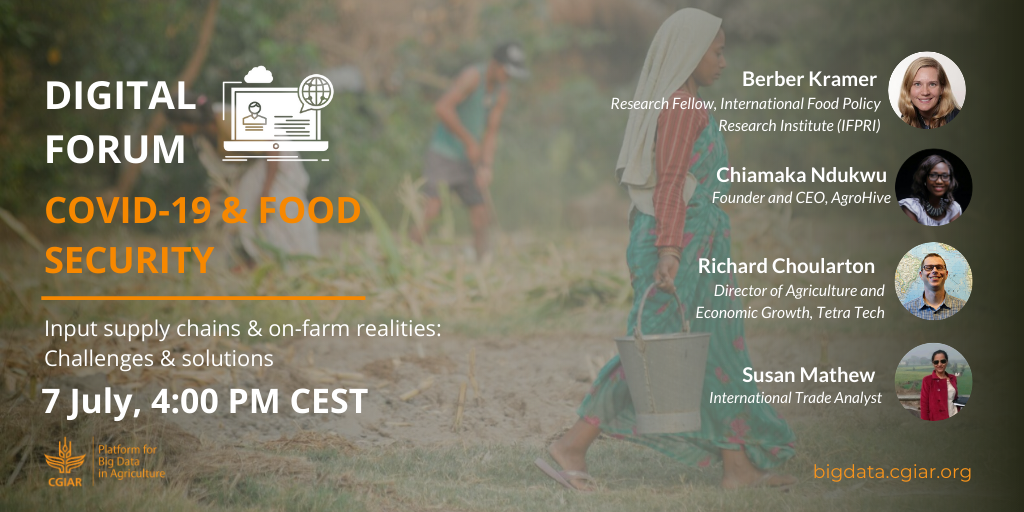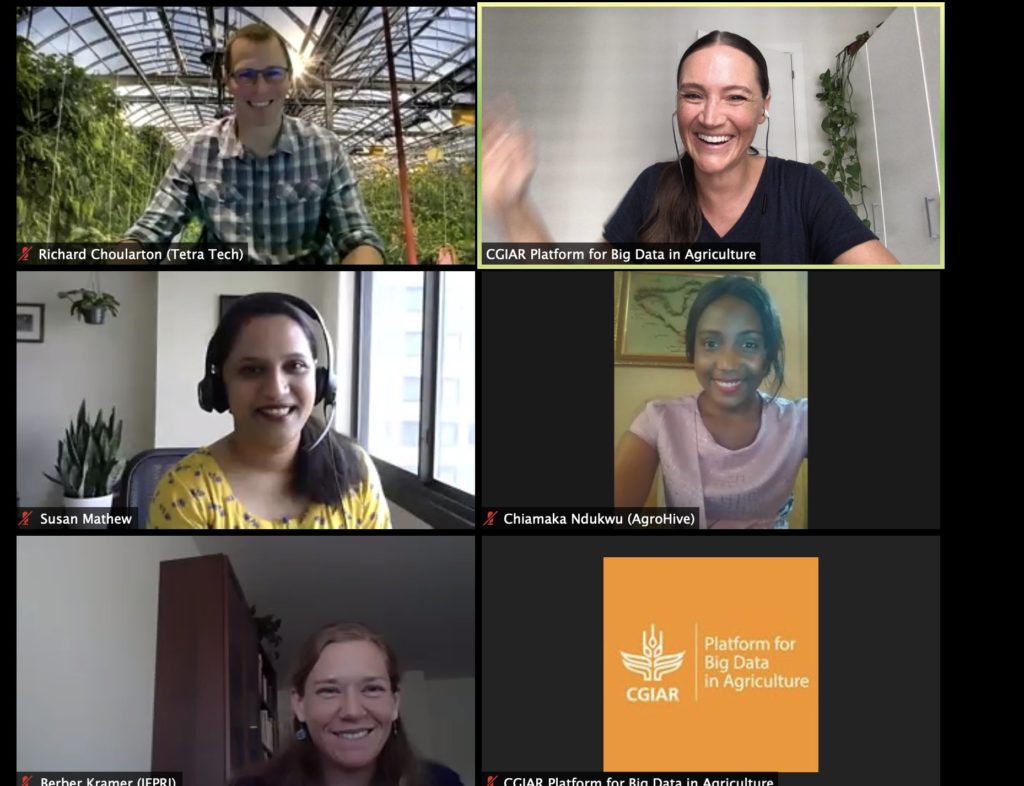WEBINAR SUMMARY – Big data & COVID-19: Input supply chains & on-farm realities (Eps. 2)
The second episode of our Discussion Series: Big data solutions to COVID-19 & food security, brought together four panelists to discuss challenges and solutions to input supply chains and on-farm realities.
From using satellite remote sensing to monitor crop harvests to leveraging social media data to track population dynamics that may influence the spread of disease, big data tools and approaches have been instrumental in sensing and responding to the pandemic’s impacts on global food security and supply chains.
As we begin recovering and (re)building resilient food systems, we must leverage the power of big data to examine concepts of resilience and inform our understanding of how digital dynamism enables adaptive food systems in the face of shocks, and, in the longer term, addresses systemic issues in agriculture that have been exacerbated by the COVID-19 crisis.
The second panel, held 7 July, brought together four panelists to discuss challenges and solutions to input supply chains and on-farm realities.
WATCH THE RECORDING HERE
Here are the main take-aways from each of the speakers:
Richard Choularton
Director of Agriculture and Economic Growth Sector, Tetra Tech
Richard Choularton is a senior associate focused on food security and climate resilience with Tetra Tech International Development Services. As former Chief of the World Food Programme’s Climate and Disaster Risk Reduction Unit, he is a recognized expert in climate change adaptation and risk mitigation, resilience, food security, emergency preparedness, and early warning systems. Richard previously served as director of the Office of Humanitarian Assistance at CHF International. He was also the decision and planning support advisor for the Famine Early Warning Systems Network (FEWS NET).
Key takeaways from Richard Choularton
- A Tetra Tech-supported survey of farmers and wholesale agro-dealers across 10 African countries showed that production and farmers’ food security was already affected by the pandemic; they experienced a lack of input supply, a lack of labour, less active middlemen, costlier transfers to market, and difficulties with harvesting;
- More than half of farmers interviewed were selling less to markets to protect their own food security;
- The pandemic affected wholesalers’ ability to source inputs, their access to farmers and retailers, access to bank credits and other financial facilities;
- We need to take into account compound risk: in areas with already high food insecurity, even minor events can make the situation critical;
- Tetra Tech aims to combine data collection with crop analytics. This will help see where farmers are planting less because of restrictions, whether they are switching crop types, changes in harvesting and yields;
- Putting crop analytics in context is key: we need to link COVID-19 infection data with market data, farm measures, seasonal calendars, and with data on other hazards, such as droughts and conflict;
- Understanding pandemic impacts on wholesalers is important, especially for designing policies that address the crisis;
- There is huge potential to use digital agricultural tools to increase farmers’ flexibility, particular when it comes to inputs and retail;
- Using data to inform policy processes is very important – e.g. in Angola and Zimbabwe, authorities prioritised farmers’ access to agricultural inputs and markets;
- Digital tools can allow both supply systems and farmers to become quicker to adapt to shocks.
Chiamaka Ndukwu
Founder and CEO, AgroHive
Chiamaka Ndukwu is the Founder/CEO of AgroHive, a Nigerian agritech company that provides agricultural businesses and farmers with appropriately trained personnel that meet their labour and skill needs.
Key takeaways from Chiamaka Ndukwu
- Currently, in Nigeria smallholder farmers who produce 80% of the food consumed internally lack the skills and knowledge for making wise agri-business decisions;
- While big farmers leveraged digital platforms to sell their products during the pandemic, small farmers were left out, affecting their revenues and access to finance;
- AGroHive is training key agri-actors through the AgroSkillup project, which includes collecting and managing data, agricultural software, sales, and marketing tools;
- Training sessions continue remotely throughout the pandemic;
- AgroHive is also training rural women in using digital tools to collect agricultural data.
Susan Mathew
International Trade Analyst
Susan is an international trade analyst and researcher with over a decade of experience in agriculture trade and regional value chains. She has served at multiple policy and implementation positions in South Asia from diplomatic missions, national and state governments, and grassroots research organizations.
Key takeaways from Susan Mathew
- In India’s state of Kerala, the department implemented an online fish auction, allowing wholesalers to trade online, without using middlemen. The data collected by the Fisheries Department became a database used by Kerala and other Indian states;
- Kerala also used the public distribution system to set up community kitchens almost overnight, providing food kits for all social classes. The state used data from the local labour department to identify guest workers in need of food provisions;
- The state agency for horticulture procured produce from farmers at farm gate level, providing fruit and vegetables to communities using mini vans.
Berber Kramer
Research Fellow, International Food Policy Research Institute (IFPRI)
Berber’s research focuses on financial inclusion and resilience, in particular on innovations in agricultural insurance and seed systems that can help smallholder farmers adapt to climate change. She leads a research program that aims to strengthen agricultural insurance and finance in Ethiopia, India and Kenya through picture-based crop insurance. She is also a recent winner of our Inspire Challenge Rapid Response grant for her project that seeks to mitigate the impact of the COVID-19 pandemic.
Key takeaways from Berber Kramer
- Despite progress in financial inclusion of the world’s poorest, microfinance is being rolled back in times of crisis;
- The Inspired Challenge project works to develop tools that help different actors in the value chain monitor their crops, so that they can access microfinance;
- Picture-based insurance used by IFPRI – i.e. insurance payments based on smartphone camera pictures – has been adapted to be used during the pandemic;
- Picture-based crop monitoring helps microfinance lenders have eyes on the ground without physical presence;
- IFPRI is partnering with a microfinance institution to increase farmers’ access to loans;
- IFPRI has also partnered with Dvara E-registry to work in India’s Odisha State; they are using satellite imagery and vegetation indexes to evaluate yield potential in farmers’ crops; the information made available to microfinance stakeholders streamlines credit obtaining processes for farmers.
July 7, 2020
The BIG DATA Team
CGIAR Platform for Big Data in Agriculture
Cali Colombia
Latest news





 Susan Mathew
Susan Mathew



